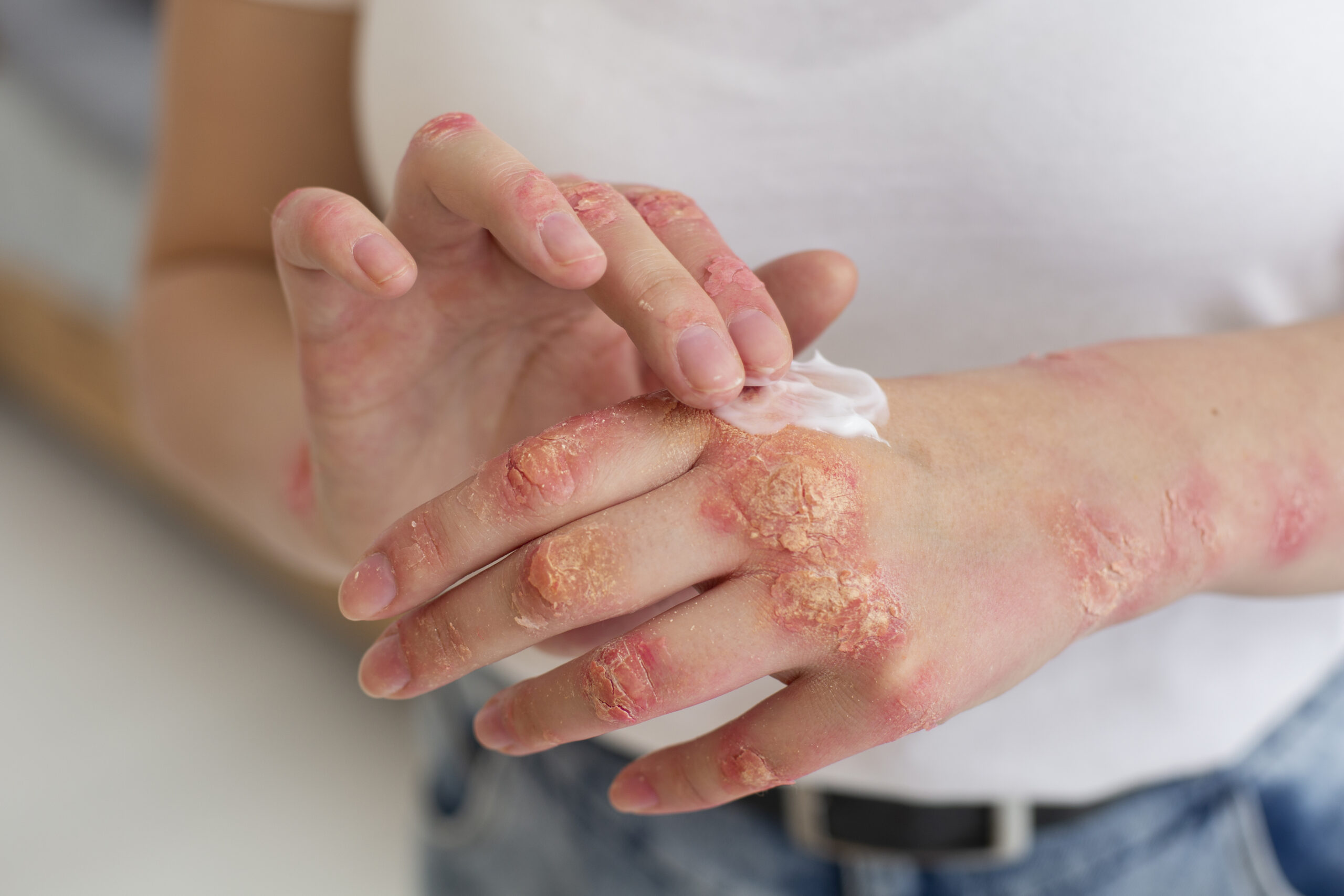Back To Top
Browse
Eczema and Psoriasis are both chronic skin conditions that can severely impact the quality of life. Both conditions are inflammatory and can cause skin inflammation, scaly patches or dry and cracked skin.
These two skin conditions have some broad symptoms in common, however their overall presentations, including specific symptoms and location of skin changes are really distinct.
Eczema and Psoriasis require a range of medications to help manage them, these Medications Eczema and Psoriasis include steroid creams to reduce the inflammation associated with these conditions, moisturizers to hydrate the skin and antihistamines to reduce itching.
You can now browse our catalogue for Eczema and Psoriasis medication over the counter or prescription at Meds For Less, and order these medicines for next day delivery to your home address.
Eczema and psoriasis are common skin conditions that can severely impact the quality of life. Although they appear similar, they are really distinct in their causes, symptoms and treatments.
Eczema (Atopic Dermatitis) is a chronic, hypersensitive, inflammatory skin condition characterised by redness, itchiness and flakiness. It is associated with other hypersensitive and inflammatory conditions such as allergies, asthma or hay fever. Symptoms or Eczema include:
Eczema can have some genetic causes although it’s mostly triggered by allergens or irritants which cause inflammation due to hypersensitivity to these triggering factors. These allergens can include things like soaps, detergents, cold or dry weather or even stress.
Treatment options for Eczema include:
Psoriasis is an autoimmune skin condition that speeds up the lifecycle of skin cycles causing a rapid buildup of dead skin cells which can lead to scaling and inflammation. Symptoms of Psoriasis include:
Treatment options for Psoriasis include:
Eczema and Psoriasis have some common symptoms and triggers, however their presentations and their treatment options are quite distinct.
Common symptoms of Eczema include:
Triggers of Eczema include:
Common symptoms of psoriasis include:
Triggers of Psoriasis include:
Treating Psoriasis and Eczema requires a range and combination of medicines that can be given depending on the severity and symptoms of each condition. The following is an overview of the most common types of medicines:
Eczema medication:
Meds for Psoriasis:
Managing eczema and psoriasis effectively shouldn’t be expensive. At Meds For Less, we provide a wide range of eczema medications and psoriasis treatments at competitive prices, including over-the-counter psoriasis meds and prescription-strength treatments. The cost of psoriasis medication can vary based on the formulation—topical corticosteroids, vitamin D creams, immunosuppressants, or biologics. We strive to offer affordable solutions, ensuring you have access to effective treatment without breaking the bank. Browse our selection to find the best eczema and psoriasis medications at budget-friendly prices, with fast and discreet delivery across the UK.
Choosing the right treatment for Psoriasis or Eczema requires careful consideration and depends on factors such as the severity of the condition, symptoms, triggers and overall individual health. Some steps you can take towards choosing your treatment includes:
Overall choosing the right treatment for Eczema or Psoriasis requires time and careful consideration. You should work in consultation with your healthcare provider to come up with a treatment plan that is suitable for you.
Eczema and Psoriasis flare ups can be challenging but with the right tips and tricks, you can manage flare up symptoms and reduce their frequency and intensity. Some of these strategies include:
Overall you can help prevent and manage Eczema or psoriasis flare ups through a combination of regular healthy skin care, avoiding triggers and following a treatment plan made in consultation with your healthcare provider.
The medicines used in the treatment of Eczema and Psoriasis are essential in managing symptoms, however like all medicines they can cause some side effects and have some associated precautions with use.
Some of the side effects and precautions of these medicines include:
Topical Corticosteroids – used in the treatment of both Eczema and Psoriasis:
Side effects
Precautions
Oral/Systemic Corticosteroids – used in cases of severe Eczema
Side effects
Precautions
Antihistamines – used for the treatment of itching in Eczema or Psoriasis:
Side effects
Precautions
Topical Vitamin D analogues/Mimetics – for Psoriasis Treatment
Side effects
Precautions
Coal Tar containing products like shampoos – for Psoriasis Treatment
Side effects
Precautions
Proper skin care is essential and necessary for managing eczema and psoriasis, as well as maintaining overall skin health. Here are some helpful tips for promoting skin healing, reducing flare-ups and protecting your skin.
For a more comprehensive skincare routine, please consult your dermatologist and they can help come up with a personalised skin care plan for you.
If you’ve never used eczema medication or psoriasis meds over the counter, it can be overwhelming to know where to begin. At Meds for Less, we make the process easier by offering:
Even if you’re unsure whether you need prescription-strength treatment or basic over the counter meds for eczema, our platform helps guide your choice safely.
Managing chronic skin conditions like eczema or psoriasis requires consistency — that’s why we offer next-day UK-wide delivery for all our products. You can:
Whether you’re running low on your regular eczema meds or trying a new psoriasis medication over the counter, our delivery service ensures you’re never without treatment when you need it most.
E45 Cream is a highly effective emollient that provides substantial relief for those suffering from eczema. Its unique formulation is designed to deeply moisturize and soften the skin, helping to alleviate common symptoms like dryness, flakiness, and itching. Clinically proven to be beneficial, E45 Cream not only soothes irritated skin but also addresses more severe dry skin conditions such as eczema, dermatitis, and certain types of dry psoriasis. Its gentle yet effective formula makes it a versatile option for managing a wide range of dry skin issues, offering comfort and relief to those with eczema and related skin problems.
Some individuals find Bio-Oil can be a helpful product for those dealing with eczema, as it is designed to lock in moisture and boost skin hydration. However it’s important to note that there isn’t a substantial amount of scientific evidence supporting its use for this condition. Therefore, it is advisable to consult with a healthcare professional or dermatologist before using Bio-Oil for eczema. They might recommend established eczema treatments, such as Betnovate Cream, which have proven clinical effectiveness in managing eczema and other dry skin conditions.
Some individuals find that Sudocrem can be helpful for managing their psoriasis, but it is always advisable to consult a medical professional before starting any treatment. A doctor or dermatologist can provide guidance on the most appropriate treatment options for your specific condition. In some cases, a specialised cream like Betamethasone Valerate might be more effective than Sudocrem, offering better relief from symptoms associated with psoriasis. Therefore, seeking expert advice ensures that you’re using the best treatment for your needs.
When it comes to eczema and psoriasis, there’s no one-size-fits-all treatment because everyone’s skin is unique. This is why consulting a medical professional is crucial to determine which medication or cream is best for you. Different treatments target various aspects of these skin conditions, with stronger options like Betamethasone Valerate addressing severe cases and milder creams like E45 being suitable for less intense symptoms. Factors like severity, age, and individual response to treatment play a significant role in finding the most effective solution. To get personalised advice, you can fill out a consultation form, email us at info@medsforless.co.uk, or visit our homepage to explore our range of treatments.
Yes, over-the-counter medications for eczema include emollient-rich moisturizers, hydrocortisone creams, and antihistamines to reduce itching. Look for fragrance-free, hypoallergenic options to prevent irritation. Severe cases may require prescription eczema medication from a doctor.
Yes, prescription medications for eczema and psoriasis may have side effects. Topical corticosteroids can cause skin thinning, while oral immunosuppressants may affect liver function or immune response. Biologic treatments can increase infection risks. Always consult your dermatologist to weigh the benefits and risks of treatment.
You can buy prescription eczema and psoriasis medications online at Meds For Less. We offer a wide range of topical treatments, oral medications, and biologics with fast, discreet delivery. Simply complete a short consultation, and our registered prescribers will assess your order.
| Cookie | Duration | Description |
|---|---|---|
| cookielawinfo-checkbox-analytics | 11 months | This cookie is set by GDPR Cookie Consent plugin. The cookie is used to store the user consent for the cookies in the category "Analytics". |
| cookielawinfo-checkbox-functional | 11 months | The cookie is set by GDPR cookie consent to record the user consent for the cookies in the category "Functional". |
| cookielawinfo-checkbox-necessary | 11 months | This cookie is set by GDPR Cookie Consent plugin. The cookies is used to store the user consent for the cookies in the category "Necessary". |
| cookielawinfo-checkbox-others | 11 months | This cookie is set by GDPR Cookie Consent plugin. The cookie is used to store the user consent for the cookies in the category "Other. |
| cookielawinfo-checkbox-performance | 11 months | This cookie is set by GDPR Cookie Consent plugin. The cookie is used to store the user consent for the cookies in the category "Performance". |
| viewed_cookie_policy | 11 months | The cookie is set by the GDPR Cookie Consent plugin and is used to store whether or not user has consented to the use of cookies. It does not store any personal data. |